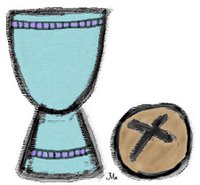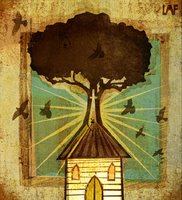 I’ve been reading the book, Mass Culture: Eucharist and Mission in a post-modern world (edited by Peter Ward) for a few weeks now. I’m still only halfway through and the bottom corners are going to be pretty stuffed by the end of it. (Top corner fold for marks my place, bottom corner for marking something interesting like a quote).
I’ve been reading the book, Mass Culture: Eucharist and Mission in a post-modern world (edited by Peter Ward) for a few weeks now. I’m still only halfway through and the bottom corners are going to be pretty stuffed by the end of it. (Top corner fold for marks my place, bottom corner for marking something interesting like a quote).
The book is a collection of ‘article’/chapters around the themes of Communion and Mission and Postmodernism (oddly enough) and how they interrelate, written by a variety of leaders from a variety of denominations. It’s facinating, pretty pleasing and enlightening stuff.
A couple of the points I’ve picked out so far (pretty much from one particular chapter) as worth exploring more or just simply interesting (here’s where I flick to the first lower corner fold and try find on the page what I found interesting)….
“Another element of post-modernism invites its audience to ‘enjoy the surface’ of life’s experiences because there is nothing beneath the surface. In other words, nothing is sacramental, nothing points beyond itself to anything else. Each experience is what it is or does ot you, there is nothing beyond. From this perspective the eucharist may give a sense of awe or of ancient community, but it can never be more than a sense, a vibe. Any such experience is understood as a feeling to be fleetingly enjoyed, it could never be more. So from this perspective, while the eucharist gives you a buzz, go for it. When it doesn’t and the ‘been there, done that, so this place as no more ot offer’ feeling comes over you, then move on to something stranger….
Life is understood as a perpetual present, or rather a series of perpetual presents – a perpetual sequence of living for the moment. From this point of view, ‘the goal of life’ is ‘an endless pursuit of new experiences, values and vocabularies’.” (p.77)
“Worship can have the power to convert or (and alas, this is more frequent) to repel. It is not just that the conduct of worship can be amazingly incompeteten; it is that people have a very real sense of whether what is being offered is the genuine article or not.” -David Stancliffe (quoted p.82)
“Alan Kreider has pointed out that the significance of worship for the mission of the early church was not that it was attractive to outsiders, but that it helped to shape Christlike lives in the world, and these lives were profoundly attractive:
Worship, to which pagans were denied admission, was all important in the spread of the Church. It was important not because it was attractive, but because of it’s rites and practices… made differences in the lives and communities of the worshippers. It performed the function of re-forming those pagans who joined the Church into Christians, into distinctive people who lived in a way that was recognisably in the tradition of Jesus…. (p.86)
“‘Seeker-friendly’ worship is important, but it must be authentic Christian worship. First, and above all, worship is for God (Eph 5:19-20)… If either edification or evangelism usurp the God-directed focus of worship it ceases to be Christian worship…”
“There is the danger that post-modern people seek experience for its own sake, that they become not more then sensation gatherers, but an experienceless Christianity is not New Testament Christianity and will never commend the faith. Churchmaship may high or low; the worship may be liturgical or more spontaneous, the focus may be on the word or the Spirit, but there is no substitute for encountering the presence of the living God.
Once again, an over emphasis on accessibility my be unwise:
“Chrisitianity’s talent for shooting itself in the foot is nowhere better displayed than its recent drive to demystify itself. Afterall, who goes into a church to get reasonable? Mystery is precisely what used to draw the crowds; no wonder gates are down.”
“…An event in which the kingdom of God is actually present is a far cry from a constructivist view, for constructivism changes nothing beyond the mindset of the constructor. In Iain Bank’s novel “A Song of Stone”, his main character says: “All is construction in the end… But we are the naming beast, the animal that thinks with language, an all above is called what we choose, for lack of better terms, and everything we name means – as far as we are concerned – just waht we want it conote. There is a reciprocity o finsult for out name-calling here; for our fine defining words tame nothing in the end, and show we ever fall victim to th unseen grammar of life, we must brave the elements and suffer their indifference, fully requited in return.”
The eucharist, though offers a positive alternative to the ‘naming beast’, one in which eternal reality bites back. We are indeed ‘naming’ creatures (Gen 2:19), but our authority to name comes with a responsible relationship with God as his stewards. The eucharist offers an encounter with this living God…”
There is potentially too much right there to pick at something specific (if you would like me to poke around with one of them a bit more, I can do that – just let me know which). No promises either, who knows what tomorrow will bring 😉
I think it’s probably been most interesting looking at the influences of post-modernity in my own life and how I treat different situations that arise, how I respond to things, what I go out of my way to do or ‘experience’.
It’s fairly confronting in the way I often approach God. I do hope I’ve moved a bit beyond the ‘live for the experiences’ (sadly that in a way, that is or used to how I treat some of life). We can’t do the immature dismissal of God by believing our doubts when we cannot see him working, when we cannot hear him, cannot ‘find’ him. God exists despite our experiences or conceptions. But oh, it’s easy to get frustrated!
There is a great beauty and life in encountering our maker. It’s a richer and fuller comprehension of something if we can feel ‘part of it’, but the experience does not mean it ceases to exist after that point or didn’t exist before we got there.
Communion/Eucharist in itself is a brilliant way to encounter the grace of God in past, future and present – and no I haven’t ultimately worked out how I’d describe how exactly God is in communion, or whether it’s simply symbolic (which In some ways I think lessens it hohum – straying into controversial ground…)
I am pleased that communion is something I get to participate in, to ‘experience’ and to meet God in. I love it that we’ve made an effort in young adults to do this together.
To be really comfortable in my postmodernism, I have no problem saying that there is definitely something about those moments, there usually is! But we shouldn’t take up the position of not ‘having communion’ – just because we don’t feel like it, or feel it.
And there I’ll cease forcing my scattered thoughts on to you. Well done if you’ve read this far. Anyone care to borrow the book?
 “I don’t see much sense in that,” said Rabbit. “No,” said Pooh humbly, “there isn’t. But there was going to be when I began it. It’s just that something happened to it along the way.”
“I don’t see much sense in that,” said Rabbit. “No,” said Pooh humbly, “there isn’t. But there was going to be when I began it. It’s just that something happened to it along the way.”

